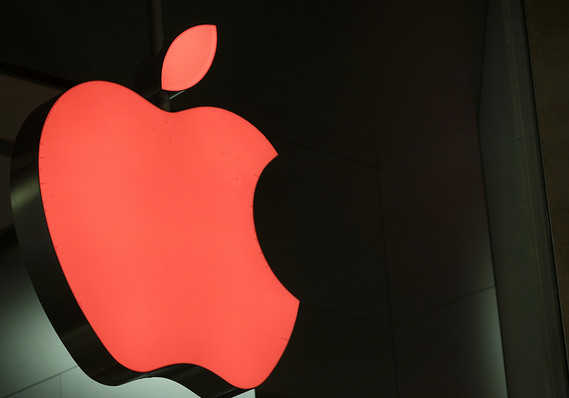
Apple flirts with bear territory
U.S. stocks closed lower Wednesday, with the Dow Jones Industrial Average logging its longest losing streak in three months, as blue-chip Apple Inc. flirted with bear-market territory.
Apple’s weakness was weighing on investors’ confidence, which had already been battered by oil’s abrupt decline in recent days.
How did the benchmarks fare?
The Dow Jones Industrial Average DJIA, -0.81% fell 205.99 points, or 0.8% to 25,080.50, its fourth decline in row, the longest such streak since Aug. 13, according to FactSet data.
The S&P 500 index SPX, -0.76% ESZ8, +0.44% dropped 20.60 points, or 0.8%, to 2,701.58 and the Nasdaq Composite Index COMP, -0.90% shed 64.48 points, or 0.9%, to 7,136.39.
What drove the market?
Apple AAPL, -2.82% extended losses for a fifth day to $186.80 a share, about a buck away from $185.65, which is bear territory, defined as a decline of at least 20% from a recent top. By dint of its lofty market value and share price, the iPhone maker has been a key proxy for investment sentiment and momentum on Wall Street because the Nasdaq and S&P 500 index are market-capitalization-weighted gauges, while the Dow is a price-weighted index.
Meanwhile, CNBC reported that Rep. Maxine Waters, who is slated to take over the House Financial Services Committee when the new Congress convenes in January, has suggested that she will rein in deregulation in the banking sector.
“Make no mistake, come January, in this committee the days of this committee weakening regulations and putting our economy once again at risk of another financial crisis will come to an end,” she said.
The S&P 500’s financial sector topped the losers, falling 1.4%.
In Europe, the U.K.’s exit from the European Union is entering the final stretch after Prime Minister Theresa May secured cabinet support for the Brexit proposal she had ironed out with the bloc.
On the trade front, investors have been dealt conflicting views from the Trump administration, with National Economic Council Director Larry Kudlow taking issue with comments made by Peter Navarro, Trump’s trade adviser, who said “globalist billionaires” are ratcheting up pressure on the White House to end its standoff with China on trade issues.
The public disagreement between the two White House officials raises questions about the negotiating strategy between China and the U.S. in testy tariff talks.
Late Tuesday, Bloomberg News reported that the Trump administration will hold off on imposing tariffs on auto imports — for now.
What data and speakers were in focus?
The Labor Department said the consumer-price index rose by 0.3%, while core CPI, excluding volatile food and energy prices, rose 0.2%.
A Q&A with Fed Chairman Jerome Powell is scheduled for 6 p.m. Eastern, well after the market closes on Wednesday.
What were strategists saying?
“We’ve had three different trading days wrapped into one, even before the market opened,” Larry Benedict, founder of The Opportunistic Trader, told MarketWatch. “Futures were very soft early this morning, but we rallied along with European stocks,” as the start of trade neared, Benedict said.
“The CPI reading was in line with expectations, maybe a bit better than expected, and the market took the cue to firm after those numbers,” he said.
“I believe [what] the stock market is experiencing is a continuation of the selling pressure that began in early October,” wrote Robert Pavlik, chief investment strategist at SlateStone Wealth, in a note to clients. Pavlik also suggested that Trump is under greater pressure to reach some sort of a detente with China on the trade war. “I suspect that given the recent election results with the Democrats taking control of the U.S. House of Representatives, President Trump probably thinks he needs a ‘win,’ and I believe that win will come eventually in the form of a trade deal with China. I don’t suspect that the trade deal will be ideal. However, our president seems to be willing to claim any result as a win. With a trade deal behind us the market should be able recapture some confidence thus bringing in buyers.”
Which stocks were in focus?
Shares of Canopy Growth Corp. CGC, -10.86% tumbled 11% after the Canada-based cannabis company reported a wider fiscal second-quarter loss and revenue that rose less than expected.
Tilray Inc. TLRY, -8.26% shares dropped 8.3% after the cannabis firm announced that third-quarter losses widened to 20 cents a share Tuesday afternoon.
Shares of Kellogg Co. K, -1.51% shed 1.5% following an investor day presentation by management Tuesday, and J.P. Morgan’s downgrading of the stock from overweight to neutral.
Snap Inc. SNAP, -3.43% slid 3.4% after the social-media company disclosed on Tuesday that is has received subpoenas and requests for information from the Securities and Exchange Commission, as well as the Justice Department, related to the firm’s disclosures to investors in the run-up to its 2017 initial public offering.
U.S.-listed shares of Tencent Holding Ltd. TCEHY, +4.27% rose 4.3% after the firm reported 30% profit growth in the third quarter.
Canada Goose Holdings Inc. GOOS, +10.02% stock surged 10% after the luxury apparel firm beat Wall Street expectations Wednesday morning for second-quarter profit and sales, while raising its sales growth outlook.
Medical technology company Vapotherm Inc. VAPO, +14.29% rallied 14% in its trading debut after pricing its initial public offering at $14 a share.
How were other markets trading?
Crude oil CLZ8, -0.07% recouped some losses as investors closely monitored prices after a steep decline battered sentiment Tuesday. Gold prices GCZ8, +0.31% settled higher and the dollar DXY, -0.10% softened.
Asian stocks were modestly lower, while European stocks were under pressure, with the Stoxx Europe 600 SXXP, +0.01% falling 0.6%.


